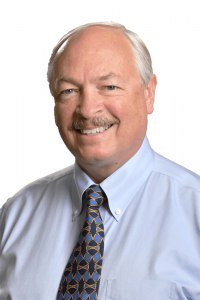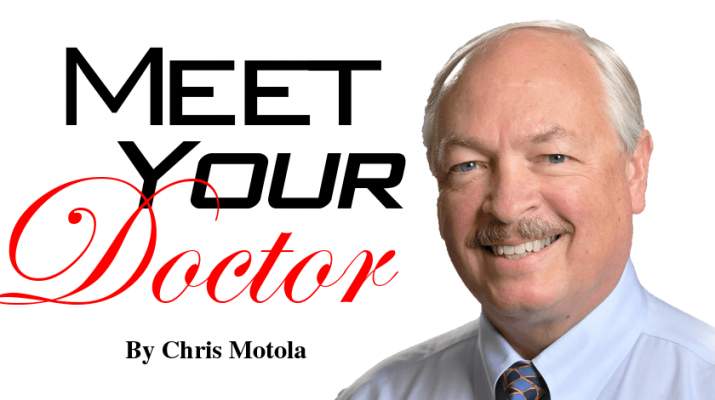General surgeon has practiced at Thompson Health for 30 years — he talks about his profession, changes in medicine and his volunteer work in Haiti
By Chris Motola

Q: You are a general surgeon at Thompson Health. Can you walk us through what you do in a hospital like Thompson?
A: I’ve been practicing here 30 years. General surgery in smaller communities really encompasses gastrointestinal surgery, colorectal surgery, breast cancer, skin cancers, endoscopies, wound care. So, it’s a pretty broad range of areas that we take care of.
Q: Have you found that your role has changed over the years with the centralization and networking of hospitals?
A: Well, we don’t do as much trauma as we used to when I first got here, which isn’t a bad thing in my opinion. It’s been pretty well-proven that trauma patients do better in specialized trauma facilities.
Q: Have the demographics of Canandaigua changed much? Are you seeing different types of patients with different issues than before?
A: There have been some changes. I think our patient population has gotten somewhat older, somewhat sicker, with more chronic illnesses. But not any dramatic changes.
Q: Your work sometimes takes you outside the Finger Lakes region. Tell us about your missions to Haiti.
A: So, I’ve been to Haiti five or six times. We’ve gone to a town called Milot, near Cap-Haitien in northern Haiti. We worked at a hospital there that’s primarily run by the Haitian physicians and administrators, but is affiliated with a hospital in New Jersey called Sacred Heart. Mostly what we’ve tried to do is help the Haitian surgeons, give them a little break and take care of the more routine cases to cut down on their backlog.
Q: Do you find being a general surgeon, having that broader base, comes in handy in that environment?
A: Yes, very helpful. A cardiologist went with us one time and said, “Haiti is really the place where you need the generals, the surgeons with a broad-base who know how to do a lot of things.” They don’t have the specialists that we do in this country.
Q: What kind of impact do you try to have while you’re there, and what impact does it have on you?
A: It certainly makes me appreciate what we have in this country more. You find yourself working there with recycled instruments and makeshift materials. You have to be more innovative there. In terms of our impact on Haiti, we’re a pretty small group, and it’s a pretty small hospital, but I guess every bit helps.
Q: When you’re training younger surgeons in a small city setting like Canandaigua, what kinds of expectations do they have?
A: We’re kind of semi-rural. We pretty much have the full spectrum of specialties here. I think the one thing some of the younger surgeons struggle with is just the amount of night-call they have to take. It’s a smaller pool of surgeons to cover the hospital. On the other hand, I think you really become part of the community in a way you wouldn’t in a larger city. You see your patients on the streets, at Wegmans, at the post office. Over time, you become more and more part of the community itself rather than just working at a hospital.
Q: Do you find recreation opportunities are a big selling point for the area? I understand you’re a fly-fisher yourself.
A: I am, but I haven’t done it in a couple years due to a shoulder injury. I haven’t been able to get out as much.
Q: What procedures do you end up doing most often?
A: Like most general surgeons, I do a lot of gall bladders, hernias, things like that. I personally do a lot of breast cancer surgery, colon cancer surgeries, a lot of endoscopies, screening for colorectal cancer, that sort of thing.
Q: Having practiced for 30 years in one location, do you find you’re able to have more of a continuum of care with individual patients than surgeons might normally have?
A: Yeah, with a 30-year time frame, I’m sometimes getting second generation family members coming through now, which is kind of nice. I think in a lot of ways, it probably makes it more fun for me and more comfortable for them.
Q: What kind of impact do you feel you’ve had on the community, and what kind of impact do you want to leave?
A: I think that the hospital itself is growing and part of that is because the people who have been here have worked very hard to gain the hospital a good reputation for patient care. I hope the community itself will be a little healthier for us having been here. And going forward, I think there are a lot of great, younger doctors who are coming in and starting to take over. So, we want this to be a place where younger doctors want to come and work.
Q: What do you think new doctors are looking for?
A: I think up-to-date technologies. We’ve been doing robotic surgeries here for about seven or eight years. I think that, for a small hospital, we’ve been very innovative. We were one of the first hospitals in New York to do routine laparoscopic surgery, and that’s become pretty much the standard of care nowadays. It was a revolution in surgery. When I finished my training, we did almost all our abdominal surgery with open incisions. Recovery was usually several days in the hospital. Back to work was six to eight weeks. Now we’re talking about sometimes being back to work the next day. But when we started it was still pretty radical. We’ve been on the forefront of a lot of those changes.
Q: With Upstate New York weather being what it is, do you sometimes end up with cases that would, in normal weather, be referred to a bigger hospital?
A: We haven’t recently, but I remember one Super Bowl a driver took out a power line. Everyone lost their television signal. Nobody was happy about that.
Lifelines
Name: Thomas Wormer, M.D., FACS
Position: General surgeon at Thompson Health
Hometown: Portville, NY
Education: Albany Medical College
Affiliations: Thompson Health
Organizations: American College of Surgeons; Canandaigua Medical Society; American Society of Breast Surgeons
Family: Wife (Melissa); four children
Hobbies: Gardening, photography, fly fishing

